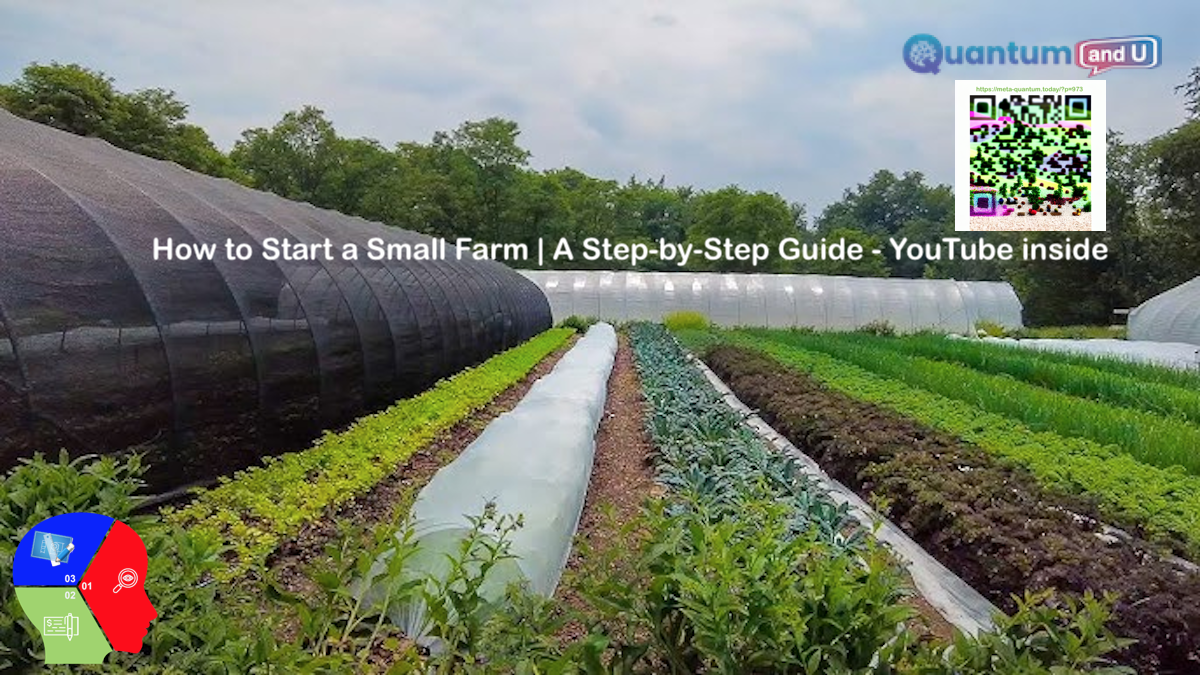
Introduction:
Our discourse pivots around an instructive YouTube video entitled, “How to Start a Small Farm | A Step-by-Step Guide,” authored by proficient farmer Jesse. He dispenses useful advice for budding and seasoned farmers aspiring to expand their enterprises. Jesse underscores the intricacy of farming, which necessitates meticulous planning and comprehension of various business facets beyond mere planting and harvesting. The tutorial video navigates viewers through the phases of initiating a farm, ranging from land allocation and equipment procurement to pest mitigation and crop sequencing. Jesse’s acumen proves advantageous for individuals embarking on their farming journey or augmenting their agricultural endeavors. Drawing on his vast agricultural proficiency, Jesse aids viewers in traversing the hurdles of operating a small farm. He presents a pragmatic perspective on farming and proposes practical solutions, rendering this tutorial indispensable for prospective farmers. In summation, “How to Start a Small Farm | A Step-by-Step Guide” transcends a typical YouTube tutorial. It’s a pragmatic guidebook that emphasizes the crucial aspects of farming, proffers valuable wisdom, and paves the way to achieving the dream of owning a thriving farm for many.
Related Sections:
- Land Ownership Isn’t Always the First Step: Farmer Jesse challenges the common belief that the first step in starting a farm is to buy land. Instead, he suggests that aspiring farm business owners should focus on other essential aspects of their venture before considering land ownership.
- Create Your Family or Personal Budget: Before delving into the farm business, Farmer Jesse emphasizes the importance of understanding personal financial needs and setting a clear budget to ensure financial stability.
- Gain Farming or Growing Experience: Acquiring farming or growing experience is crucial to success. Farmer Jesse recommends working on other farms, volunteering, or growing food in small-scale settings to gain valuable insights and skills.
- Develop a Business Plan and Farm Budget: Farmer Jesse stresses the significance of a well-developed business plan and farm budget. These documents outline financial goals, expenses, and revenue projections, providing a roadmap for the farm’s success.
- Consider Business Structure and Land Leasing: Farmer Jesse discusses the importance of selecting the right business structure and exploring land leasing options to reduce initial capital requirements and risks.
Conclusion:
Starting a small farm is a complex but rewarding venture that combines hard work with strategic planning and financial acumen. It’s vital to treat the farm as a business, focusing on essential areas such as budgeting, experience, and a solid business plan. Creating a robust budget is vital, ensuring more income than expenditure, and allows for unforeseen circumstances like market fluctuations and adverse weather conditions. This approach helps aspiring farmers build a resilient and sustainable farming operation. Experience in farming, gained through volunteering, internships, or online research, is another critical factor. Not only does it give a practical understanding of agriculture, but it also helps determine if farming is the right career path. A comprehensive business plan can spell success for a farm. It should include the farm’s vision, financial projections, operational and marketing strategies, and even contingency plans. This roadmap ensures efforts are directed towards achieving the farm’s objectives. Expert farmer Jesse advises new farmers to be open to learning and make informed decisions. He claims that farming is as much about continuous learning as it is a business. Every bit of knowledge can contribute to building a resilient farm business. In summary, starting a small farm is a daunting task. However, with proper planning, continuous learning, and informed decision-making, it can also be an incredibly rewarding journey.
Takeaway Key Points:
- Land ownership may not be the first step in starting a farm; focus on other critical aspects first.
- Separate personal and family budgets from the farm budget to ensure financial stability.
- Gain farming or growing experience to understand the nuances and challenges of farming.
- Develop a comprehensive business plan and farm budget to guide your farm’s success.
- Explore land leasing options to reduce initial capital burdens and test your farm business idea.
- Treat farming as a business and be open to learning and adapting along the way for sustainable long-term success.


